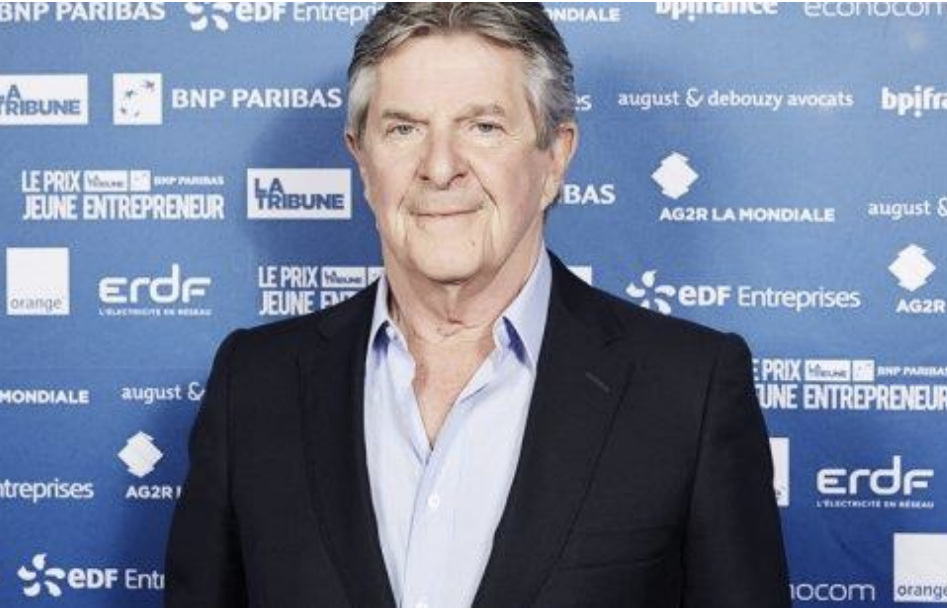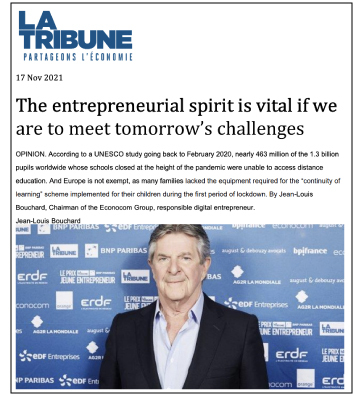Published on 17 November 2021 Enterprise IT, Sustainability
After the United Nations Climate Change Conference, COP26, in Glasgow and in the continuity of his previous speeches on our positioning as a responsible digital entrepreneur, discover our President Jean-Louis Bouchard's opinion column published in the daily French newspaper La Tribune.

OPINION. According to a UNESCO study going back to February 2020, nearly 463 million of the 1.3 billion pupils worldwide whose schools closed at the height of the pandemic were unable to access distance education. And Europe is not exempt, as many families lacked the equipment required for the “continuity of learning” scheme implemented for their children during the first period of lockdown. By Jean-Louis Bouchard, Chairman of the Econocom Group, responsible digital entrepreneur, Jean-Louis Bouchard.
“One need not hope in order to undertake, nor succeed in order to persevere.”
said William of Orange.

(Credits: all rights reserved)
The reality is that we have a digital divide that has become synonymous with digital social exclusion as digital technology has taken a hold on our daily lives.
Looking to a new growth model
With social exclusion now suddenly in the spotlight, many companies and NGOs have taken action to supply refurbished computers, tablets and smartphones. Recovering used equipment and giving it a second life: while the circular economy model is not really new, it sounds like something akin to a revolution today.
Whether as a means of fighting the digital divide by offering affordable equipment to as many people as possible, or respecting our environment by reducing our use of natural resources, the circular economy model is winning increasing numbers of converts as people come to realise that it could give birth to a fairer and more responsible society.
However, a scale-up is inevitable if we want the circular economy to become a viable alternative to existing business models. Still marginal, the circular economy is nowadays very often seen as something confined to the social and solidarity economy (SSE). A genuine paradigm shift will only happen if the circular economy is made systemic: any company should be able to see it as a source of business growth.
So how can we organise this transition of which we still have a limited understanding? How can we bring about such a profound transformation of business models against such a disquieting social and environmental backdrop?
*****
The entrepreneurial spirit in action
During the pandemic, the young French engineer Guillaume Rozier – who single-handedly developed the Covid Tracker tool in just a few days – provided a telling illustration of how pragmatism and responsiveness were essential qualities in bringing an effective response to a crisis.
Agility and pragmatism are the very qualities that define the entrepreneurial spirit, whose merits we have so often praised in recent years - and that makes sense. Driven by the constant search for impact, entrepreneurs will systematically push back the boundaries, innovate, take risks, learn from their mistakes and seek efficiency and relevance in their actions.
So what if entrepreneurial spirit was quite simply the starting point of this shift?
In practical terms, entrepreneurial spirit means assuming the right to make mistakes and adopting a continuous improvement mindset. Being an entrepreneur means starting, failing and starting over again: it means silencing any thoughts that business and responsibility are incompatible. It means daring to say that responsibility can be a lever for growth. It means offering customers and consumers products and services that allow them to make their environmental transition and building solutions with them that truly meet their needs and deliver maximum impact.
How can we generate growth and create jobs while accelerating the transition to more responsible business: isn’t entrepreneurship, with the pragmatism and agility it entails, the solution to this complex equation? An entrepreneur’s chief virtues are common sense and responsiveness – two virtues we sorely need for this transition to the circular economy model.
You can view the original article on the La Tribune website here.
*****
For more information on Econocom, please visit www.econocom.co.uk
